|
|||
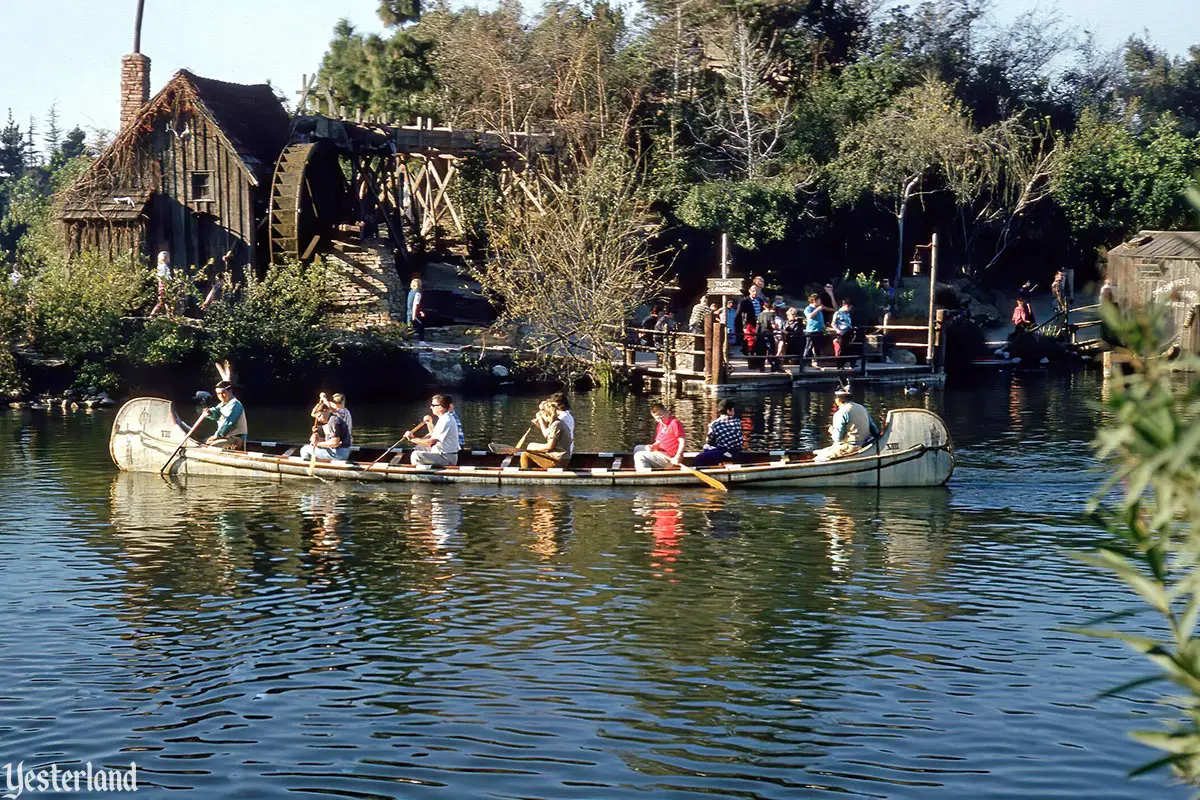
Photo by Charles R. Lympany, courtesy of Chris Taylor |
|||
|
|
|||
|
Most Yesterland ride vehicles run on electricity. A few, such as the Pack Mules and the Conestoga Wagons, are animal-powered. Others involve a diesel engine or steam engine. One attraction has human-powered vessels. Welcome to the Indian War Canoes! |
|||

Photo by Charles R. Lympany, courtesy of Chris Taylor Canoe base at the Indian Village |
|||
|
This isn’t a “sit back and relax” ride. Get ready to work. Grab either a child- or adult-size oar, and climb into a long canoe. You and every other canoe guest will help to propel the craft around Tom Sawyer Island, the site of Fort Wilderness. You’ll be helped by two actual American Indian Guides—one in front and one in back. Their impressive biceps will compensate for all the pre-schoolers onboard. |
|||
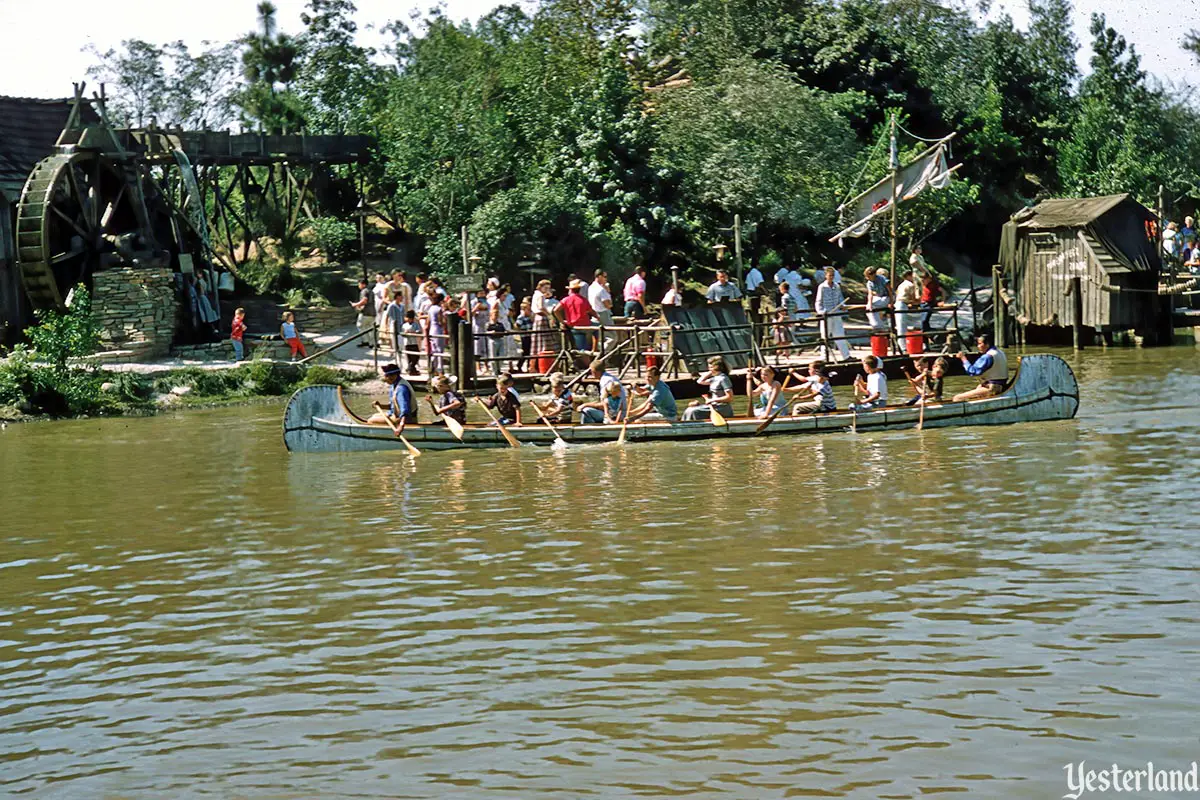
Photo by Charles R. Lympany, courtesy of Chris Taylor Passing the Old Mill, Tom’s Landing, and Catfish Cove |
|||
|
This ride isn’t on tracks. You may take different routes on various trips. In fact, you might even pass another canoe. |
|||
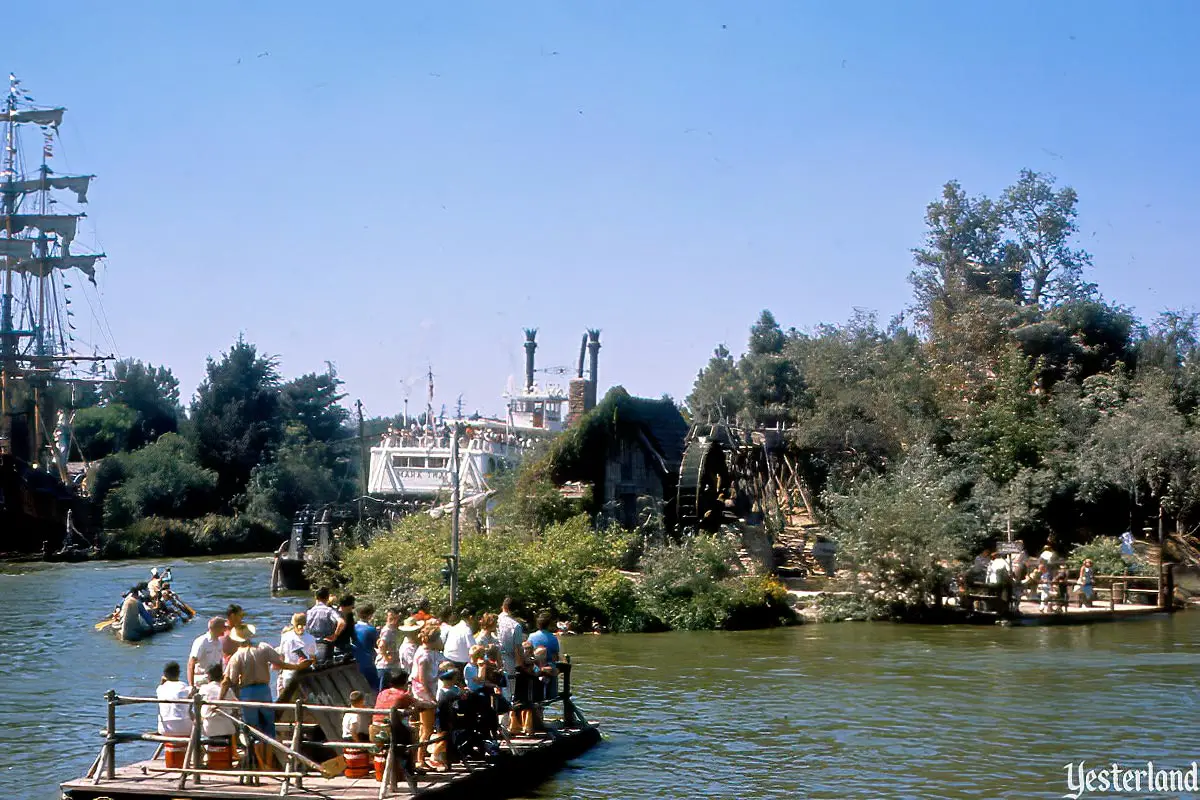
Photo by Roger J. Runck, 1960, courtesy of Robin Runck River congestion |
|||
|
The river can be quite busy. Your Indian Guides will make sure that your canoe doesn’t collide with a Keel Boat. |
|||
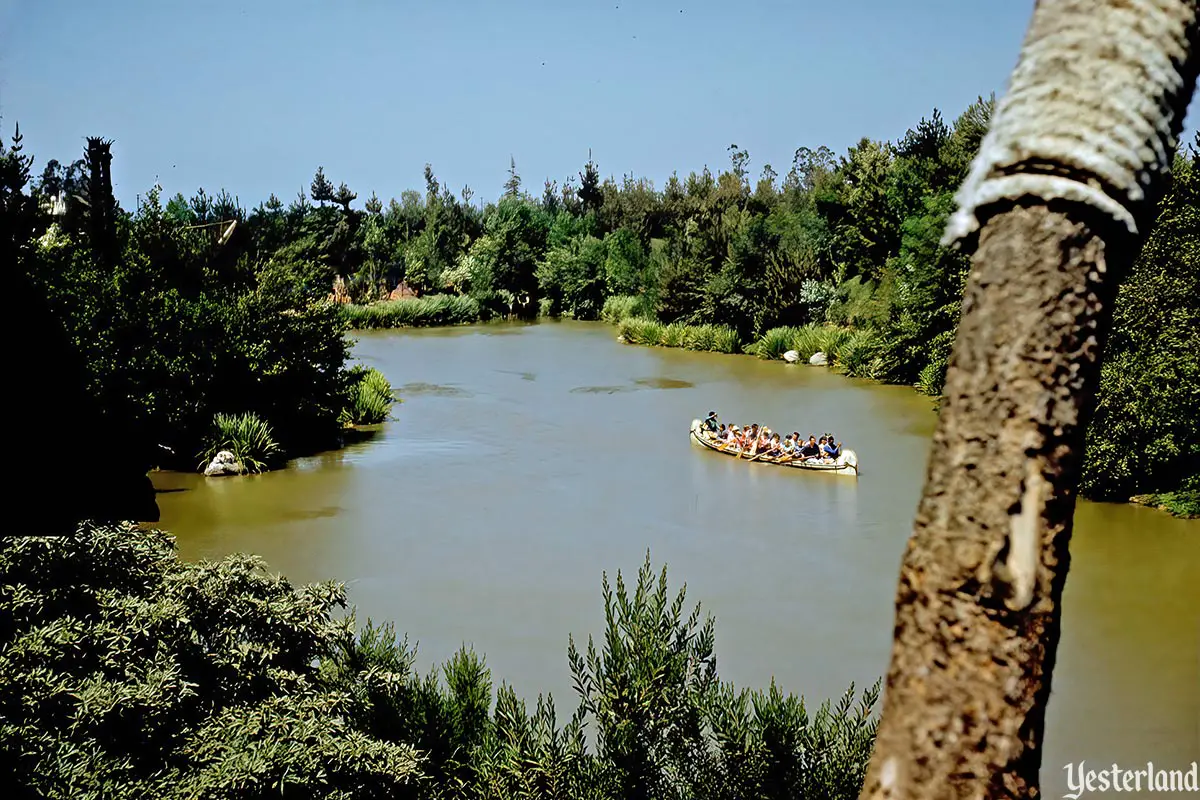
Photo by Fred M. Nelson, Sr., 1959 Wide open river |
|||
|
Your canoe may also have a part of the river all to itself. That’s when your guide might ask you to row really hard to see how fast you can go. Here’s some advice. Try not to sit behind a 4-year-old. You’ll wind up soaked. |
|||
|
|
|||
|
Indian War Canoes opened July 4, 1956, as part of Disneyland’s new Indian Village in Frontierland. |
|||
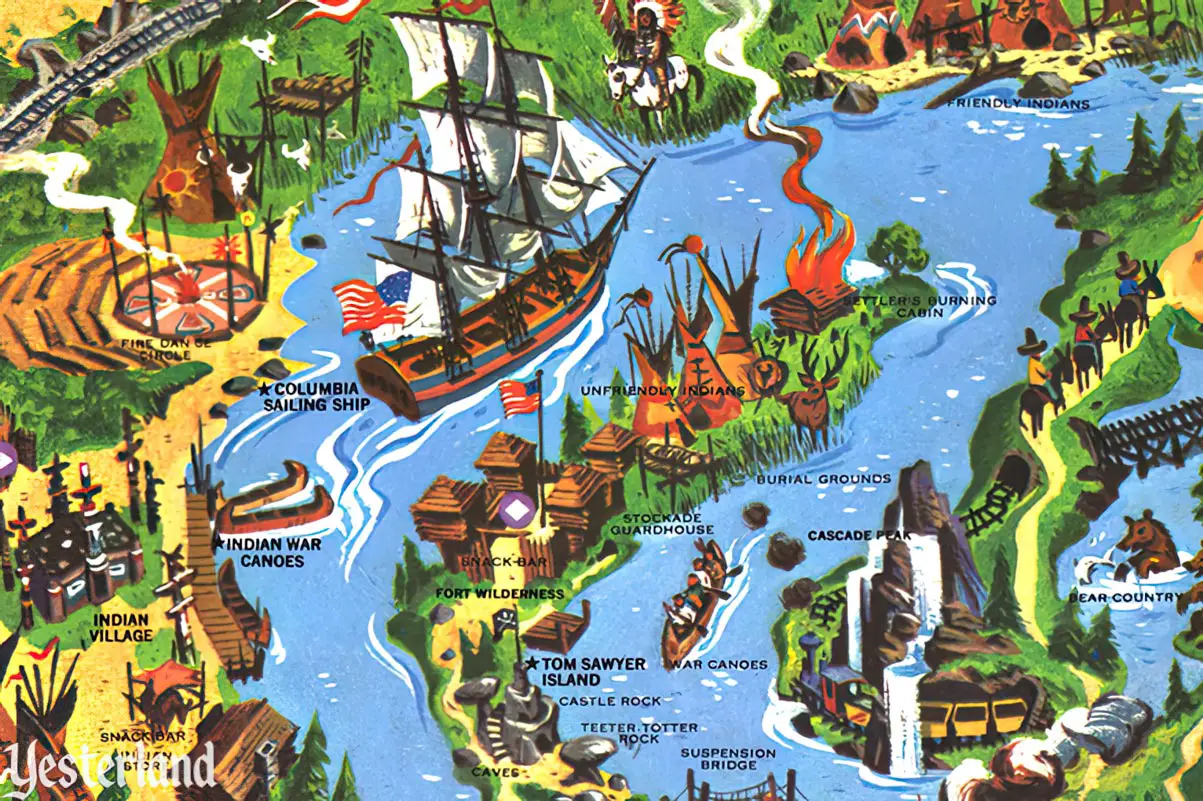
Part of the 1968 Disneyland souvenir map © 1968 Walt Disney Productions American Indians in Frontierland, from the 1968 Disneyland souvenir map |
|||
|
As the 1968 map shows, Native American lore—or at least the Hollywood version of it—played a prominent role in early Frontierland. That’s not surprising, given the popularity of Westerns on television and in movie theaters in the mid-1950s. The Davy Crockett episodes of Walt Disney’s Disneyland television series featured friendly and unfriendly Indians, which inspired scenery along the Rivers of America. Indian War Canoes operated on busier days only, primarily in the summer and on weekends. |
|||

Photo by Allen Huffman, 2003 Davy Crockett’s Explorer Canoes sign |
|||
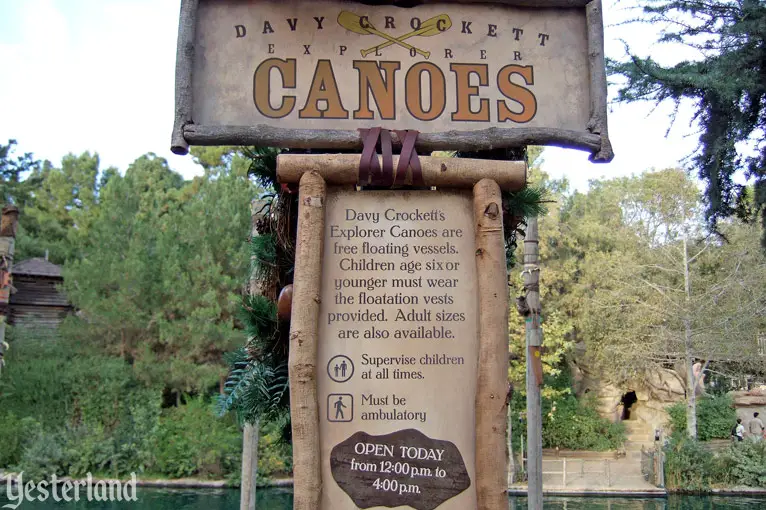
Photo by Allen Huffman, 2005 What to expect |
|||
|
On May 19, 1971, Indian War Canoes became Davy Crockett’s Explorer Canoes. The Indian Village closed permanently that year to make way for a seventh land at Disneyland. When the new land, Bear Country, opened in March 1972, Davy Crockett’s Explorer Canoes ensured that the land would have more than one ticketed attraction. In 1989, Bear Country became Critter Country. The canoe ride gained the distinction of being the only single-location ride to be in three different lands over the years. (The Disneyland Railroad is in multiple lands only by virtue of having multiple stations.) |
|||
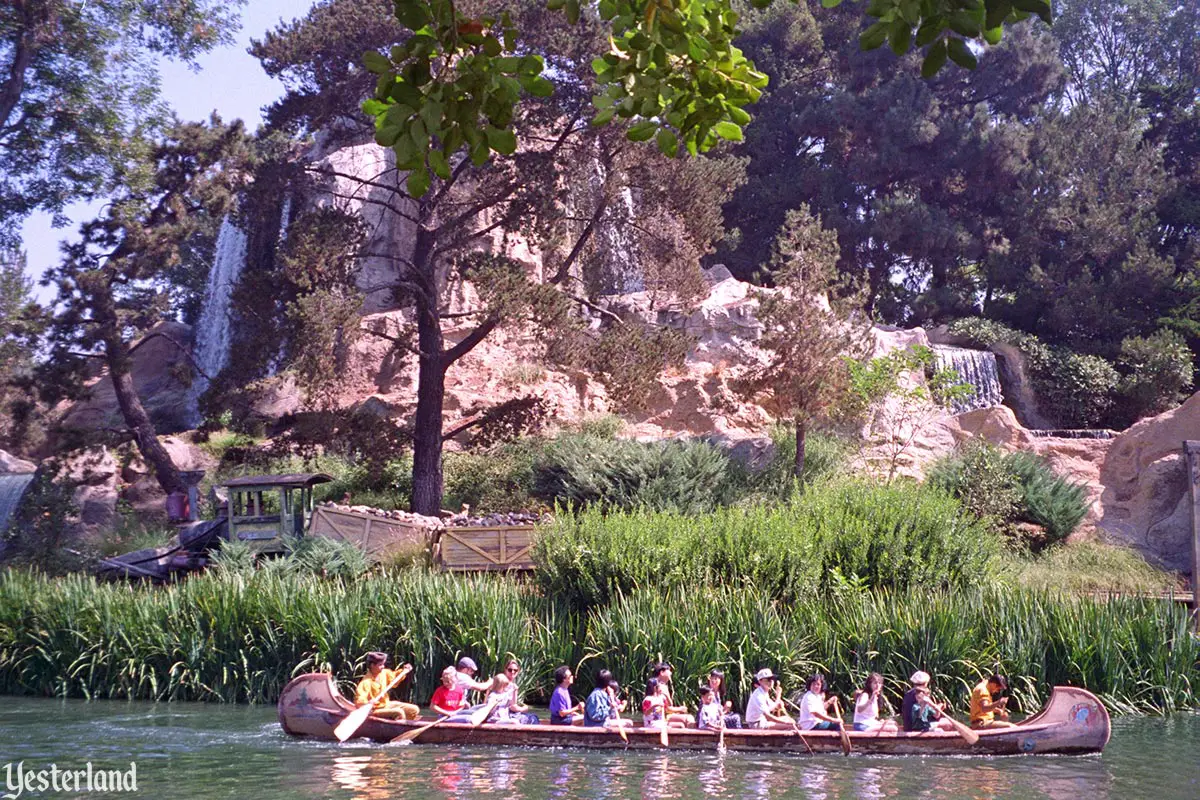
Photo by Werner Weiss, 1996 Davy Crockett’s Explorer Canoes at scenic Cascade Peak |
|||
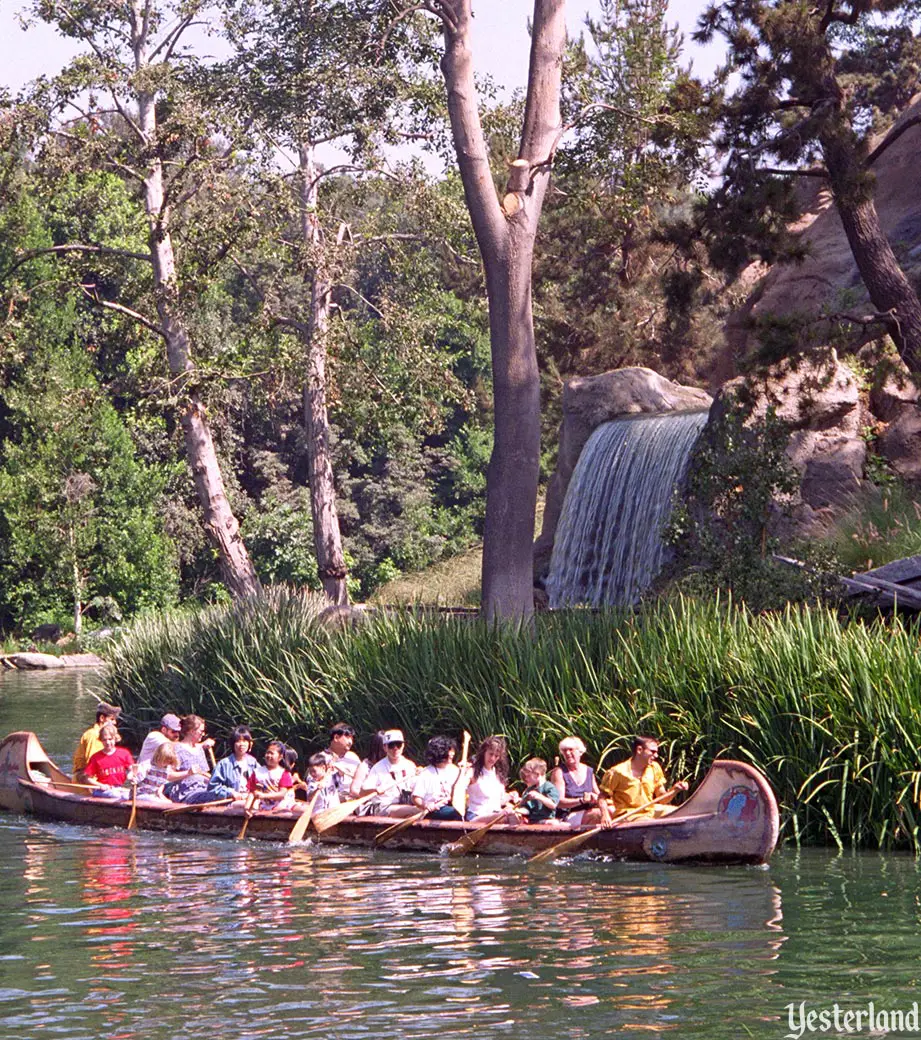
Photo by Werner Weiss, 1996 A mighty waterfall at Cascade Peak |
|||
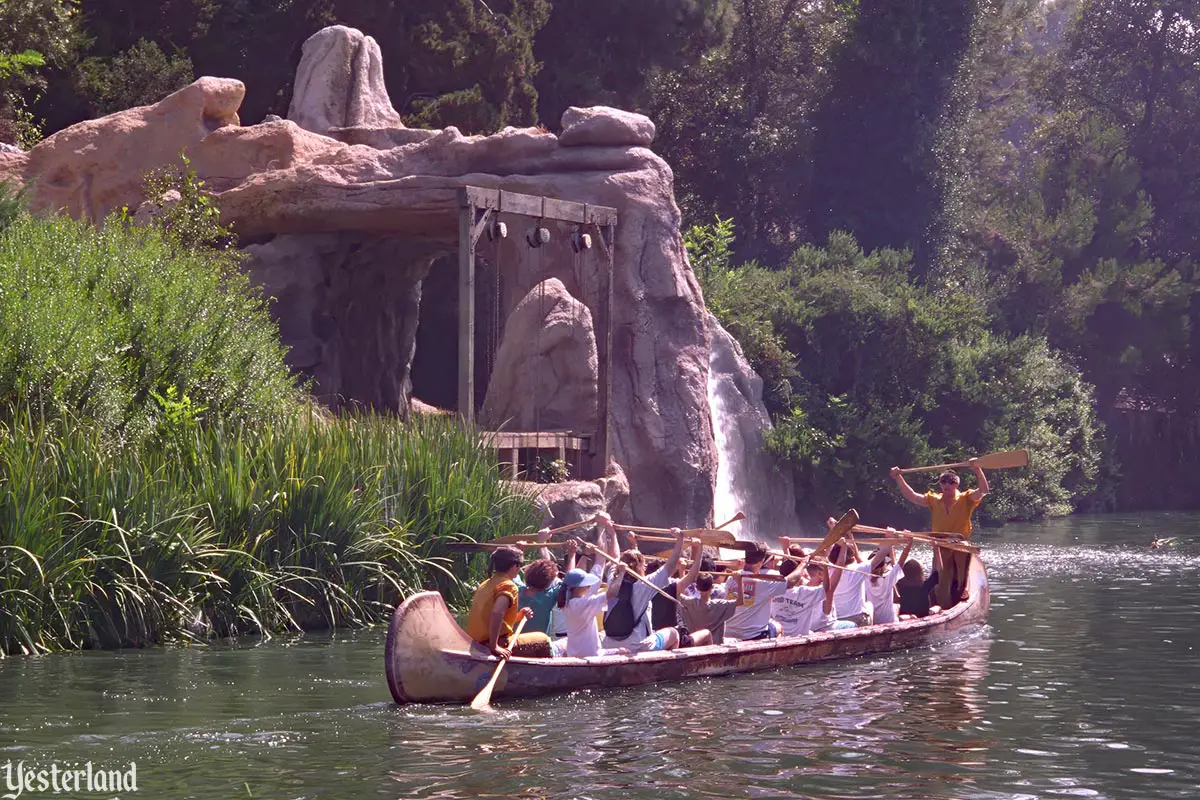
Photo by Werner Weiss, 1996 “Stop rowing. Oars above your heads!” |
|||
|
Magic Kingdom Park at Walt Disney World permanently closed its Explorer Canoes ride in 1994, but the ride continued to operate at Disneyland. On October 3, 1998, it seemed that the Disneyland ride would join its Magic Kingdom counterpart on the list of defunct Disney attractions. On that day, Disneyland’s Davy Crockett’s Explorer Canoes closed unexpectedly—before its scheduled end-of-season closing. Many fans and cast members didn’t expect to see the canoes ever again due to Disneyland management’s push to increase profits by reducing expenses. Each canoe required two cast members, making the attraction expensive to operate in relation to its capacity. It seemed to be a repeat of what had happened to Disneyland’s original Submarine Voyage. It had just closed in September 1998, as its Magic Kingdom counterpart had closed in 1994. The canoes were back in summer 1999 after all. And, even better, when that summer wound down, the canoes became a year-round attraction, as reported by E. Scott Reckard in the Los Angeles Times on August 31, 1999: Another change involves the Davy Crockett Explorer Canoes, a Frontierland summer fixture and a favorite of employees who compete in canoe races before the park opens. In a break with recent practice, Disneyland Executive Vice President Cynthia Harriss has decided to keep the canoes operating past the end of summer, said a worker who a year ago had feared the attraction would be closed forever to save money. “We were all completely floored” by Harriss’ decision, the employee said. Hooray! |
|||
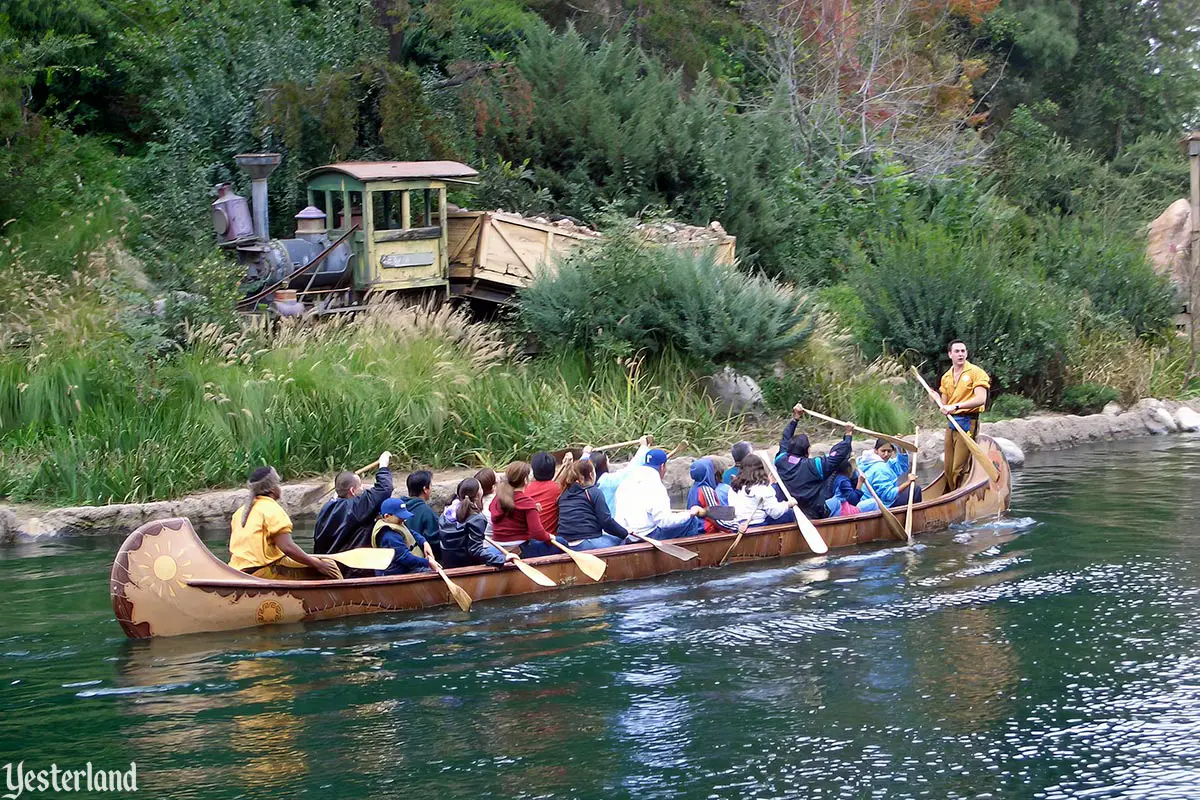
Photo by Allen Huffman, 2004 After the removal of Cascade Peak |
|||
|
Cascade Peak, shown in the photos from 1996, is gone. Originally opened in 1960 as part of the Mine Train Through Nature’s Wonderland, the hollow, man-made peak was bulldozed in Fall 1998. Over the years, water had severely damaged the peak’s structure, including its wooden framework. The economical solution was to remove Cascade Peak and its beautiful waterfalls. |
|||
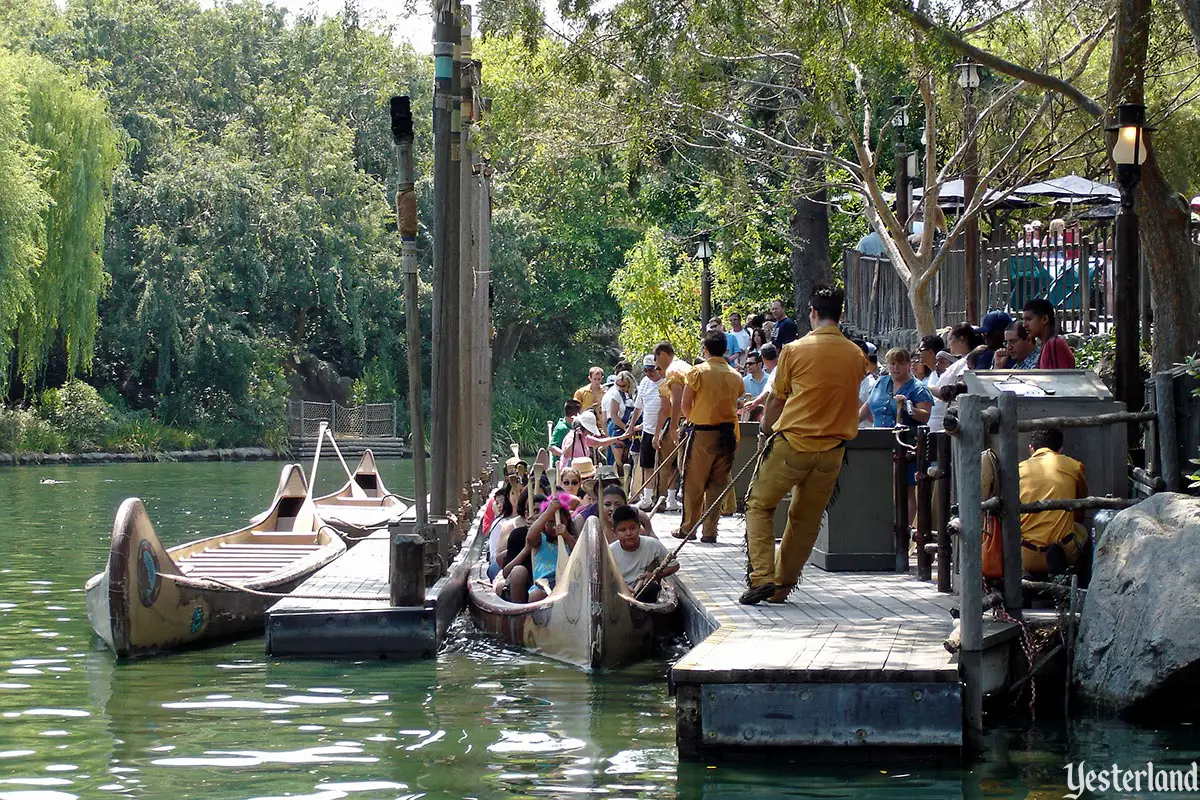
Photo by Allen Huffman, 2005 Load area for Davy Crockett’s Explorer Canoes |
|||
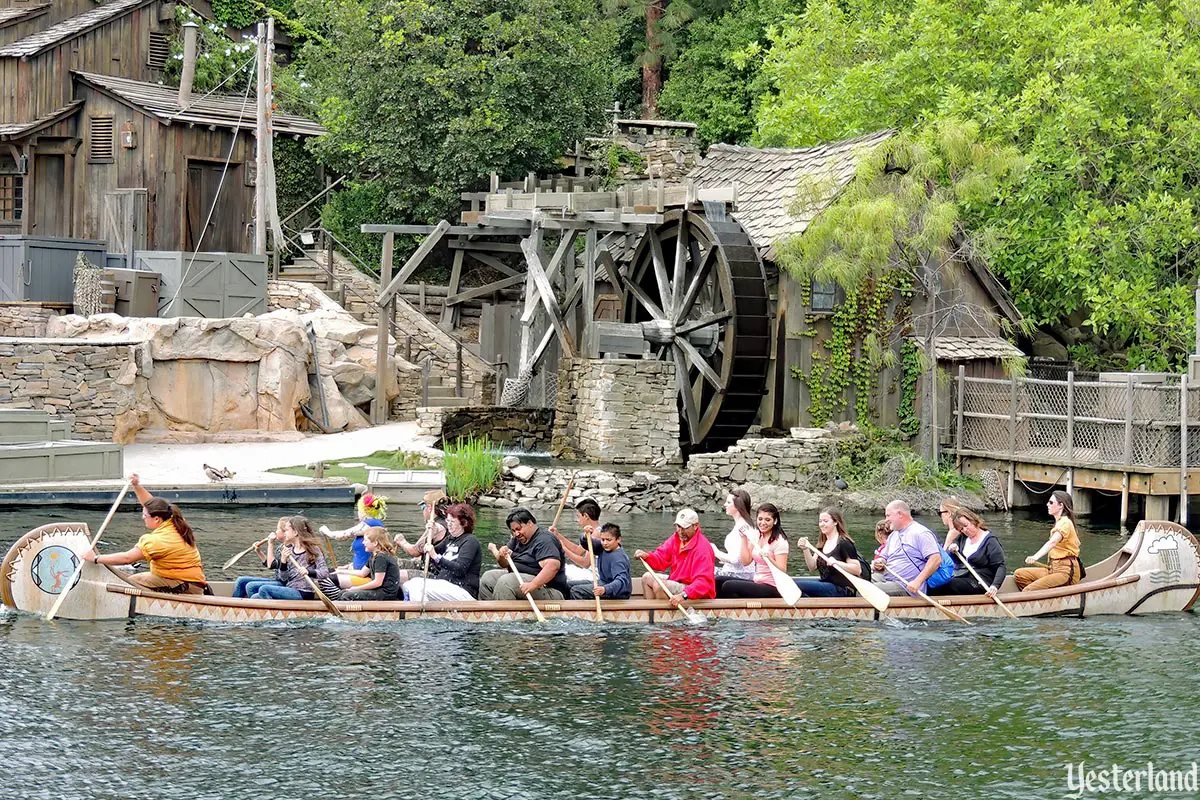
Photo by Werner Weiss, 2013 Female guides |
|||
|
When the ride opened as Indian War Canoes, only Native American men were “cast” as canoe guides. By the time the ride was renamed Davy Crockett’s Explorer Canoes, the guides were still always men, although not necessarily Native Americans. That didn’t change until 1995 when Disneyland finally opened what had been gender-specific attraction positions. Here’s an excerpt from an Orange County Register article about the change to the policy (“‘Unisex’ Policy at Disney Theme Parks: Disneyland’s Yearlong Program Means Women in Submarines and Men on Storyland Boats as Hosts,” by Marla Jo Fisher, July 12, 1995): For 40 years, the theme park chose ride operators based on gender—with frilly-frocked women working Storybook Land and men in pith helmets wisecracking through the Jungle Cruise. But last month, the first woman took up oars to help guests paddle canoes around Tom Sawyer Island, and the first man in 38 years piloted a Storybook Land Canal Boat through the whale’s mouth. Soon, female conductors will be working the Main Street Omnibus and Disneyland Railroad, and female sailors will be on the Columbia and Mark Twain Steamboat. The revolution was triggered by Suzanne Barnaby, 33, a ride operator who went to Walt Disney World in February and came back and asked her boss, “Why do they have women pilots on the Jungle Cruise there and we don’t?” The next time you’re at Disneyland, grab an oar and paddle around Tom Sawyer Island. The Rivers of America loop has been shortened for Star Wars: Galaxy’s Edge. |
|||
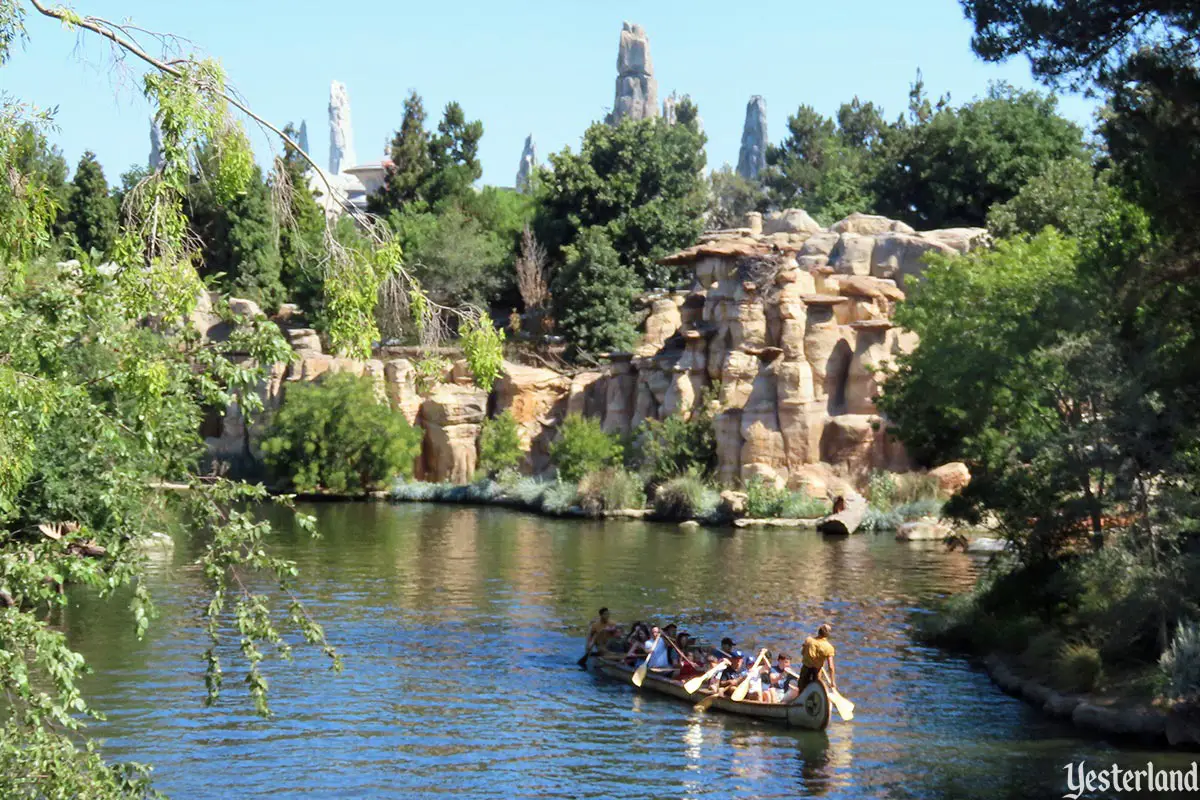
Photo by Chris Bales, 2022 With the spires of Star Wars: Galaxy’s Edge beyond the edge of the Rivers of America |
|||
|
The trees along the shore are much bigger. Your guide could be any qualified cast member. The attraction name has changed. But your experience will still be similar to what guests enjoyed in 1956. |
|||
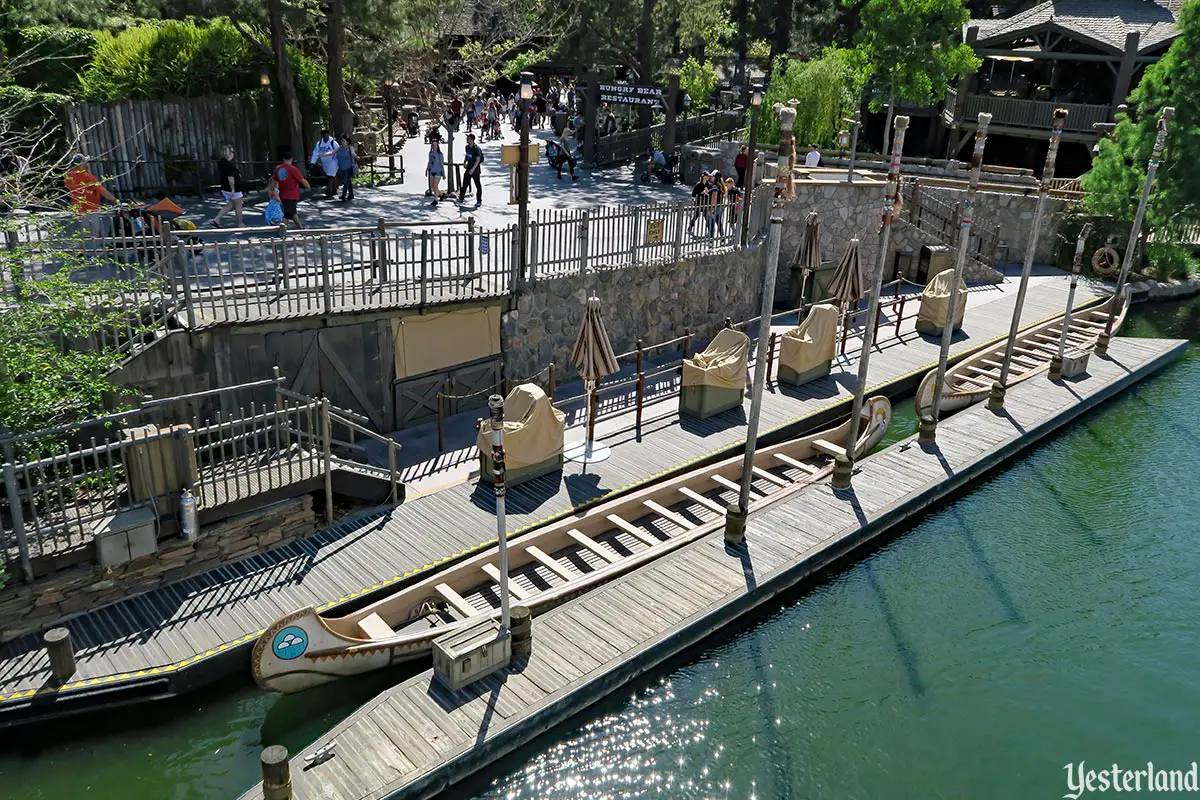
Photo by Allen Huffman, 2018 Not operating |
|||
|
Or at least try to grab an oar. Unless you’re there on the right day at the right time, the attraction won’t be operating. |
|||
|
|
Click here to post comments at MiceChat about this article.
© 2024 Werner Weiss — Disclaimers, Copyright, and Trademarks Updated August 23, 2024 |
||
